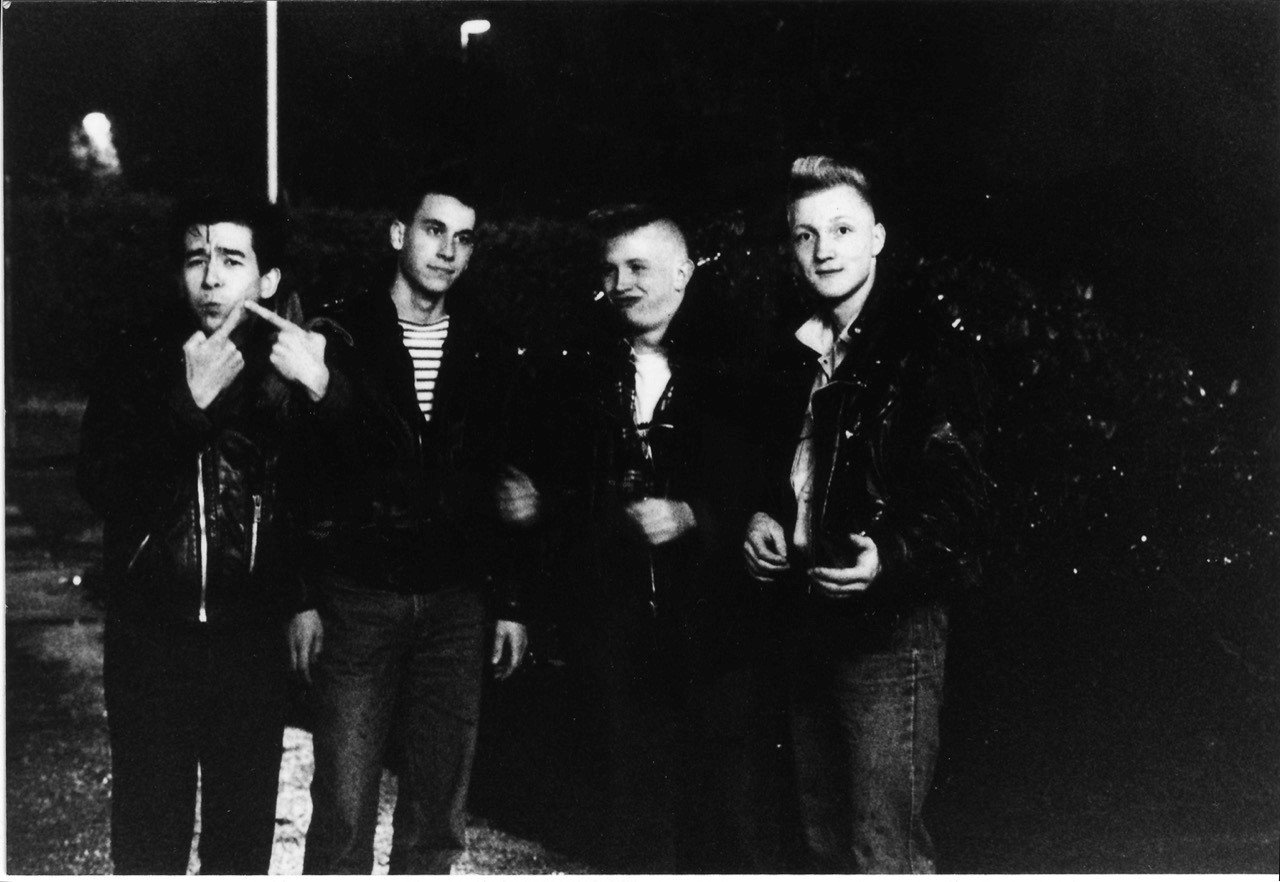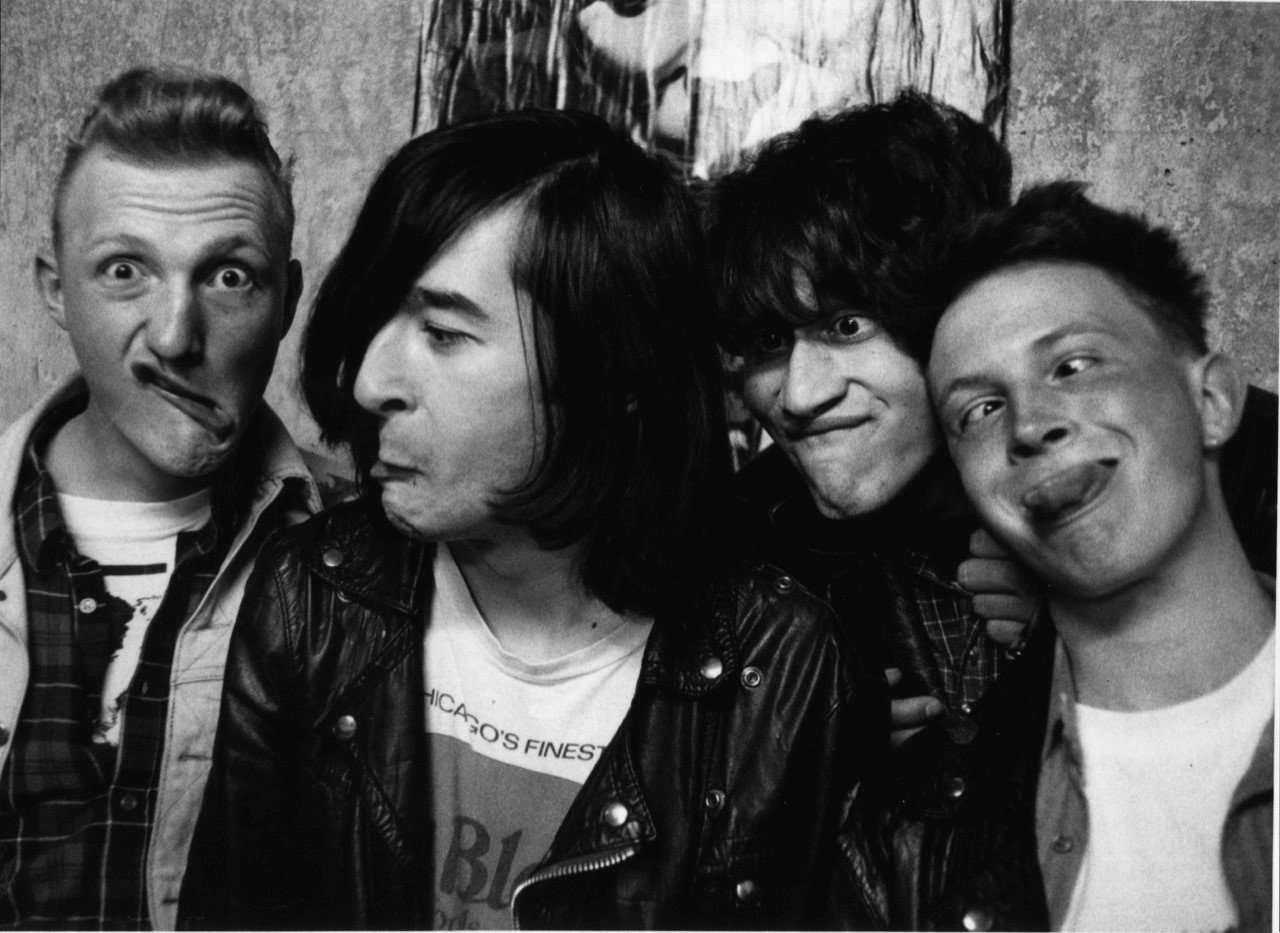The Monsters – Masks
Publisher: Voodoo Rhythm - VRMC77
Playing time: 29 min
Specifications: half track ¼", stereo, RTM SM911, 1 plastic reel, CCIR, 510 nWb/m, 38 cm/s
Reel(s): 1 plastic reel, with stickers
Packaging: 1 standard cardboard box, with stickers
Inserts: 1 booklet with 4 pages
Homepage: https://voodoorhythm.myshopify.com/products/mc-tape-the-monsters-masks-master-tape-copy-1989
Translation of the German review:
In the analog forum of the German Analogue Audio Association, I noticed the thread titled "Hot ears with a limited master tape copy" (Heisse Ohren mit einer limitierten Masterband-Kopie). I clicked on the first link: "bandcamp masks, 1989" and found myself directly in the introduction of the production. Then, as I clicked the promo film and watched Beat-Man, the frontman of the band "The Monsters" insert the tape and start the recording, I got stuck on that scene of the singer and guitarist starting the master tape copy on the Studer B62: https://www.youtube.com/watch?v=TsGSUBHnDeE
That was 1:42 minutes that enriched my world: It was immediately clear that I would not get past this tape. It was exactly from my time! I contacted Steff Bossert. He specializes in tapes and has dedicated himself to saving the "good old stuff". The master tape copies also come from him. So the album "Masks" by "The Monsters" saw the light of day again after 34 years. The re-release is in the form of the contemporary revival product number one, the tape. There will be exactly 66 copies in stereo half-track, 38 cm/s, 510 nWb/m, CCIR on a new RTM SM 911 Studio Master Tape. The packaging and reels are customized. The price is with 150,00 € in the absolutely affordable range.
The music is described as "Garage Punk & Pure Teenage Trash A Billy". The attributes punk rock, rockabilly and disaster also fit well. So you have to like it loud, not too complex and a bit provocative. Compared to many other master tape copies, this production definitely makes the difference! It was copied 1:1 as it was recorded at that time. I feel catapulted back to the 1980s with every cell in my body with this sound!
The focus of this project is culture, representation of the zeitgeist. The authenticity is in the foreground. For me, it's about nothing more than half an hour of full throttle fun. I don't mind that the music comes out of my speakers a little hung up. The songs stomp, scream, howl, are straight ahead and transport a clear message. To learn more about the background of this production, I did an interview with Steff Bossert:
Claus: What a revival of the 1980s! You brought in a context to the youth riots in Switzerland at that time. What was going on there?
Steff: In the 80s Switzerland was culturally and politically very well-behaved. There were hardly any concert venues, there was nothing going on. With the youth movement, a new cultural scene emerged, new music, new labels and new bands like The Monsters. This punk or bluestrash was the music to go with it. This subculture hardly existed before. The conservative Switzerland, but also some old hippies were irritated by the music. Two things happened in Bern: there was a squatted cultural center and an alternative settlement. Both were evicted and the young people were angry.
Claus: Were these emotions in harmony with the music produced? Did they reinforce or benefit each other?
Steff: Yes, that was "our" music with the punk part. We were pissed off, the music was raw. There were illegal, small concerts. For that, this music was great.
Claus: How did the previous generations react? There must have been a conservative attitude that completely collided with the spirit of optimism.
Steff: Yes, I think that was the case with punk everywhere at that time. Quote from the previous generation: "That's not music, that's noise. Learn to play an instrument first". That was the reaction. When I heard punk for the first time, I was also stunned at first.
Claus: And now you revisit the topic 34 years later and transport it by tape to the year 2023. Are the old fans still at the start? Or is there also a new fan community?
Steff: The tape is sold mainly in Switzerland, but also for example in Germany, in France, in the USA, in Mexico and in Finland. All directly through Beat-Man's Voodoo Rhythm label. He has an international fan base. There are also young fans, including my 19-year-old son, who plays in a band with Beat-Man. The young musicians can make music in the age of Spotify, which is simply clicked. My son and other young musicians, on the other hand, are fascinated by this raw and authentic way of making music. That's why Beat-Man is still successful.
Claus: What happened in the 34 years in between? Did you go your separate ways and the topic popped up again all of a sudden or was the idea for the re-release on the wish list for a while?
Steff: I work in a museum for cinema technology in Bern. My involvement with analog media brought me back to tape. Through my son, I talked to Beat-Man about tapes. He said that master tapes of his label still existed, which we then looked at together. Some of the tapes were not playable (sticky tape syndrome). Together with the Swiss National Sound Archives in Lugano, we were able to solve the problem. My project to make fully analog copies was not really understood at first. They thought I simply wanted to digitize. However, the idea of my project is to save old master tapes as witnesses of music history and make them accessible to the public again. They restored the tapes that needed it. It is very important to me to do my work properly. I have a network of professionals who support me. For example, for technical advice, that's Johannes Gfeller, professor emeritus of media conservation (Staatliche Akademie der Bildenden Künste Stuttgart). It's my turn to look for more master tapes in Switzerland. I'm doing interviews with the people I get the tapes from. They tell the story of the tapes. Where was it made, with which machines, etc.... It's about the overall context. That's what I find exciting. For example, in Bern I found the sound engineer who had made the recordings of Mani Matter (Swiss singer-songwriter) at that time with the simplest of equipment.
Claus: What is the story of this re-release?
Steff: After watching Beat-Man's tapes, we started with his first LP. We decided to do a limited, hand-signed edition of 66 copies. The artwork from before was still there. We taped the 66 cardboard boxes together in my kitchen. We looked at offering the tapes quite cheaply.
Claus: The tape was copied on studio machines "from back then". Which machines are we talking about?
Steff: The reproducer is the Telefunken M15A. Recorder is the legendary Studer B62 (it has the same audio cards as the Studer A80). For the American market (NAB) I have a Studer A807. It is important that all machines are well maintained and tuned to the RTM SM911 tape. As part of my research, I was also able to acquire a Studer C37 from a studio. For all machines, the overhaul is done by the experienced Studer Revox technician Jürg Breitinger.
Claus: Are the old tapes reworked in the studio?
Steff: There is a purely analog transfer from the original studio master tape recordings made in 1989. There are no digital effects, level adjustments or post-processing. You get what's on the studio master tape.
Claus: Are there any more contemporary documents like this? Are there more tapes coming for re-release?
Steff: After the good success of "Masks" we have another exciting album from Beat-Man, which we will release. I also got most of the tapes from the Swiss label Fata Morgana. I would also like to release two or three things there, but I still have to clarify the rights. I still have contact with another studio where there are numerous master tapes in the cabinets. I have archived all the tapes in the air-conditioned storage room of the Kinemathek Lichtspiel under optimal conditions.
Claus: I would like to know something about the history of the band. When was the foundation? How was it with the recordings?
Steff: The Monsters were formed in Bern, Switzerland in 1986 and released the EP called "Nightmares" a year later. In 1989 they recorded their first album called "Masks". After many shows in Switzerland, they decided to go to Lucerne to Schweinesound Studios to record an album and spent three days doing it. It was the first LP released on the Bernese record label and store "Record Junkie Records" in an edition of 666 copies. Record Junkie Records stopped releasing records after a few years. Beat-Man worked in this store and when it collapsed, he founded the label Voodoo Rhythm Records, which is still active today, just like the band The Monsters.
Claus: Thank you very much for the interview.
Translated with www.DeepL.com/Translator (free version)
Music:
Sound:
The entire content and the individual elements of the web page are the intellectual property of Claus Müller and are subject to copyright protection. They may not be copied or imitated in whole or in part by the user; this applies to texts, logos and image components. Any modification, duplication, distribution or reproduction of the website or parts thereof, in any form whatsoever, is not permitted without the prior written consent of Claus Müller.
Der gesamte Inhalt und die einzelnen Elemente dieser Webseite sind geistiges Eigentum von Claus Müller und unterliegen dem Schutz des Urheberrechts. Sie dürfen vom Nutzer weder kopiert noch im Ganzen oder in Teilen imitiert werden; dies gilt insbesondere für Texte, Logos und Bildbestandteile. Jegliche Veränderung, Vervielfältigung, Verbreitung oder Wiedergabe der Webseite sowie Teilen hiervon, gleich welcher Art, ist ohne vorherige schriftliche Zustimmung von Claus Müller nicht zulässig.








